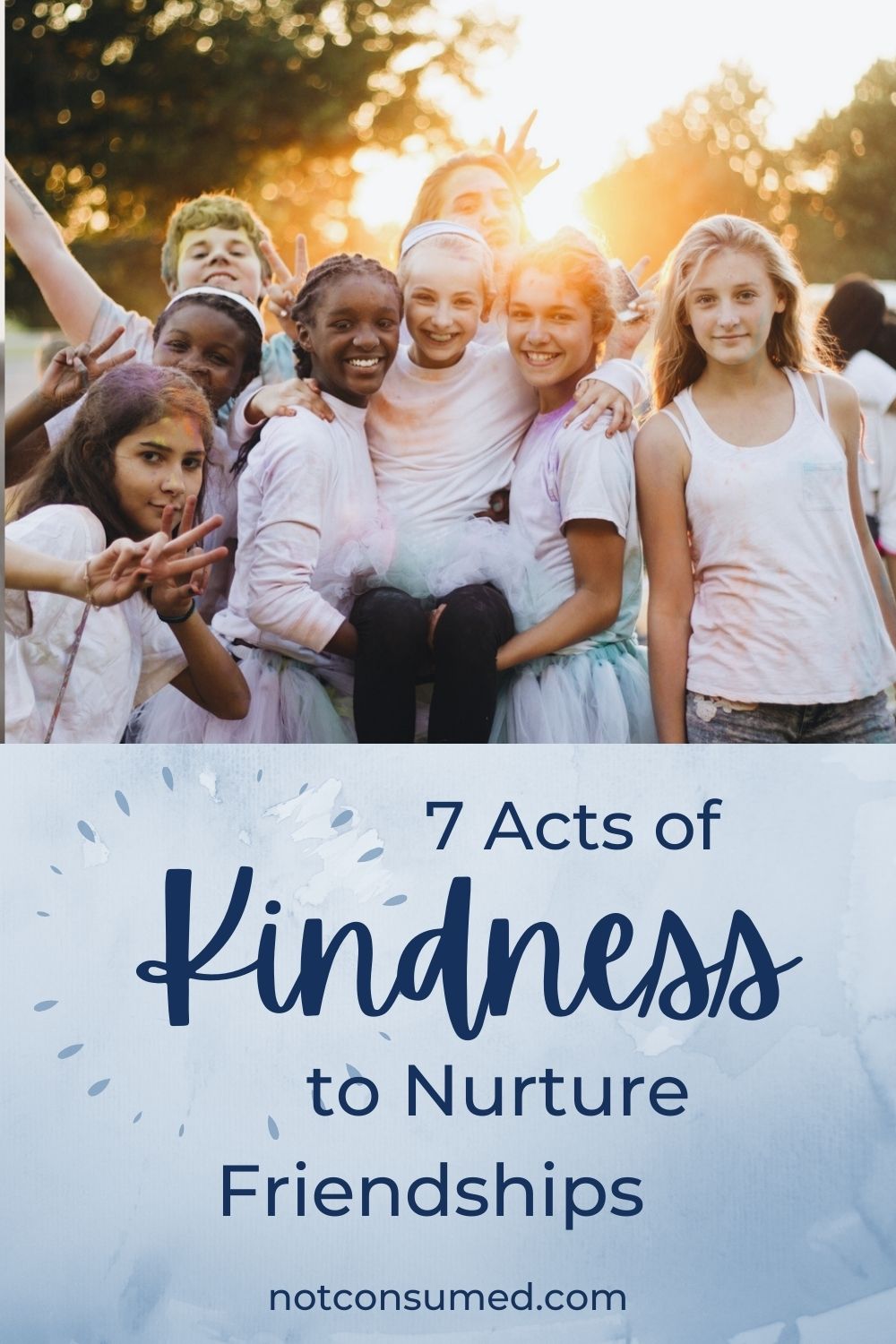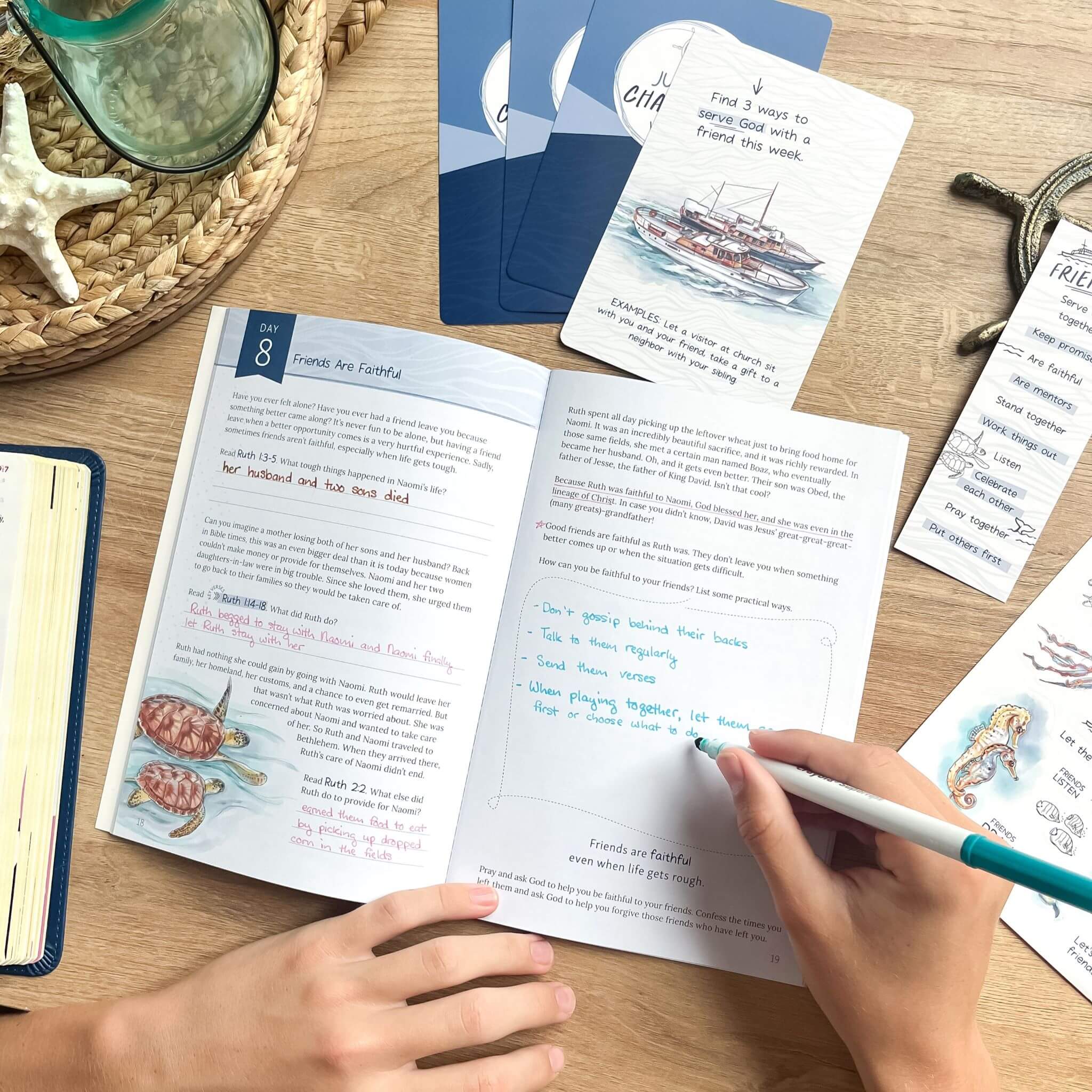7 Acts of Kindness to Nurture Friendships
FRIENDSHIP IS NOT about waiting for others to act like a friend TO YOU. It’s our acts of kindness for our friends that create friendships we desire. Read on . . .
We want good things for our kids. One of these good things is good friendships—we want our kids to find good people who will be loyal and encourage them to do right. But actually making friends is hard for many kids! For some, it comes naturally. For the rest of us, we have to learn and be intentional. This is one truth I shared with my daughter when she was in middle school.

Her sister was a natural. Everyone was friends with her. But Leah just wasn’t the same. Friendships were hard. She didn’t always know what to say, and few people walked up and made an attempt to befriend her. I told my daughter something I wish someone had told me at her age. FRIENDSHIP IS NOT about what others can do for you. It’s not about waiting for someone to act like a friend TO YOU. It’s about being a friend to others. Our acts of kindness TO OTHERS create those friendships that we desire.
Table of Contents
How to Nurture Friendships Through Acts of Kindness
1. Initiate Friendship.
When my middle school daughter was struggling, I encouraged her to look for people who needed a friend and then BE the friend. Instead of looking to fit in with people or be in a certain group, I encouraged her to look for people sitting alone and strike up a conversation. This simple act initiated dozens of friendships in church, groups, traveling, camps, and even as a dual-enrollment student at college!
This is truly the best way to build strong friendships that stand the test of time and don’t fall apart if you forget to wear or say the right things. But it’s also one of the kindest things we can do. Everyone needs a friend, but most of us don’t really know how to build quality friendships—especially when we are in our teen years.
Another great way to encourage your kids to do this is by reminding them to look around for the person who doesn’t seem to know what’s going on and take them under their wing. Kids love explaining things to others and feeling like the expert! They can use this enthusiasm to help others feel loved and included.

2. Put Others First.
We go hiking in the woods a good bit, which means encountering bears is a very real possibility. Once when looking for bear spray, we saw a shirt that said, “No need for bear spray. Just hike with a friend that is slower than you are.“
It was funny but also sad because the reality is we live life like that. Okay, I know most people would never actually do that, but every day we make little decisions to put ourselves first. Instead, put your friend first. The Bible tells us to:
Do nothing from selfish ambition or conceit, but in humility count others more significant than yourselves.
Philippians 2:3
Most people are happy to “help” until it slows them down or is inconvenient. We fall into the trap of helping only if it’s not a sacrifice. Helping others may require us to slow down and be intentional. It may cost us something, but it is always worth it! Jesus was the ultimate example of this. Friendship is a sacrifice. You don’t push your friend down as bear-bait.

What does this look like practically?
- Look for those struggling to keep up. Drop back and cheer them on.
- When you see someone who has too many things to carry, offer help!
- Stop to talk to someone even if you are in a hurry.
- Don’t make things a competition. Make it something you do together!
As parents, it may take a little reminding and even pointing out needs. We can mention something like, “I’ve noticed your sibling has a lot of school work and chores to do. Could you help out in any way?” or “Your friend seems really discouraged. Maybe you could offer to talk with them.” The act of offering to help others will impress the importance of kindness on our kids and make them better friends in the process!
3. Give Generous Gifts.
Encourage a spirit of hospitality and generosity in your child by helping them share with their friends. Letting them pull out their favorite toys while friends are over instead of hiding them teaches them to give their best to others rather than being selfish. But sharing doesn’t come easy for anyone. This is something your kids will need to practice and something you’ll want to help them with.
Drum up ideas for ways that your kids can share with others. One day, send them to class with cookies for everyone or a snack like Chex mix for Sunday School. You can even suggest that they bring a sheet of stickers to church just to pass them out and be kind. Passing out goodies to their friends is an instructive experience for your kids of how blessed it is to give rather than receive!
Here are 10 Valentine’s Day Bible verse printables your child will enjoy giving to their friends, but don’t wait for a holiday. You can give stuff like this anytime! When you do, it’s even more meaningful than doing it when everyone else is or when it’s expected.

4. Speak Kind Words.
Words are hard enough for us as adults, right? Our kids need to learn early that their words can be either a powerful tool for kindness or a destructive weapon. They need to choose wisely!
We can set a good example by watching our own words. Remind them what gossip is and help them avoid it in their conversations with you. Then, they can do the same with their friends. When I was young, I learned that someone who will gossip to you will also gossip about you. Help your kids steer clear of this friendship-killing habit!
The good thing is that when we use our words wisely, we can strengthen our friendships! Help your kids practice kindness in thinking of encouraging things to say like “I love your laugh” or “You are so kind to people—that’s one reason I’m glad you’re my friend.” The Bible says words of kindness are life! We can help our kids learn this while they are young.

5. Write an Encouraging Note.
While speaking kind words is definitely an important action, there are more ways to be kind through our words! There are times we may not be around to speak to someone when they need encouragement, but we can do something else instead.
Encourage your child to write a kind note to someone. Maybe they can leave a note in their friend’s backpack for them to find when they get home or send a postcard to a friend who is far away. Another fun idea is to write a bunch of notes and put them all in a jar to give to a friend. Then, when he or she is feeling sad or discouraged, they can pull out a note from their friend to read!
My kids use these Fruit of the Spirit Love Notes to encourage each other and their friends. It’s a great way to write a simple note that also shares biblical truth!

6. Be Consistent.
A great way to nurture friendships is by being consistent. We need to help our kids learn to be consistent, with new and old friends, in all situations.
I like to remind my kids to be on the lookout for ways to be a consistent friend, someone people can trust to be a friend. Maybe it’s asking the new neighbor to go for a bike ride, sitting with different groups in Sunday School, or smiling and waving to someone they met at church. We can be a great example in helping our kids be consistent in all types of friendship situations.
This verse in Proverbs comes to mind often as I remind my kids to be consistent friends:
A friend loves at all times, and a brother is born for adversity.
Proverbs 17:17
Whether it’s teaching them to ask questions and be a good listener, encouraging them to seek out playdates, reminding them to talk to their shy friend at church, or helping them drop off cookies to someone from youth group who is sick—these things will help our kids be a consistent and trustworthy friend in all situations.
7. Talk About Jesus.
Sharing about Jesus to others is hard for most of us. That is true in part because we make it harder than it is. We assume several things that make it nearly impossible:
- We assume we must have the whole story mapped out in verses to show them in the Bible.
- We assume it’s our job to foster the results.
- We assume we have to know everything the Bible says in order to do this.
NONE of those things are true! Yes, it’s great to learn things and grow in Christ so we can better share Him with others. In fact, the more you grow, the easier this becomes. But the biggest thing we can share with others is found in 1 Peter 3:15.
But sanctify the Lord God in your hearts: and be ready always to give an answer to every man that asketh you a reason of the hope that is in you with meekness and fear.
1 Peter 3:15 KJV
Talk to your kids about this verse and help them to see what it means. As Christians, we are called to be different. We might make a different choice. We might react differently. We might see a viewpoint that someone else doesn’t see. When your friends notice these things and ask why, this is your chance to share how God has helped you.
When my son went through his first round of chemo, this became his weekly goal. We prayed before arriving, and he handled the blood draws, needles, and port access like a champ. When the nurses would marvel at his strength, he would always say, “God helps me!”

That’s all it takes to be a witness! Share the hope. Tell others how God helps you. Explain why you are different sometimes. It’s the kindest thing you could ever do. One day, your friend might ask for more information. If you know, show them. If not, remind your kids that there are people who can help, like pastors, teachers, and youth group leaders!
More Resources on Kids’ Friendships
Friendship is a topic Christian parents should diligently pursue! Our kids need good friends, but they need help navigating the waters of friendships.
Find more tips for nurturing kids’ friendships here.
Find prayers for friendships here and enjoy this free printable!
Are you seeing any areas in which your kids need help with friendships? We have a Bible study specifically for them! Check out Navigating Friendships to encourage your kids in their acts of kindness toward others and equip them to enjoy healthy friendships now and in the future! It is part of our Relationships Series, designed to teach your kids Biblical principles for developing and strengthening Christian relationships. Each bundle contains five age-appropriate Bible studies: Obey, My Brother’s Keeper, Making Peace, Becoming a Servant, and Navigating Friendships— plus, some fun bonus items! Check out the collection!


Through practical tools & Bible-based resources, Kim Sorgius is dedicated to helping your family GROW in faith so you can be Not Consumed by life’s struggles. Author of popular kid’s devotional Bible studies and practical homeschooling tools, Kim has a master’s degree in education and curriculum design coupled with over 2 decades of experience working with kids and teens. Above all, her most treasured job is mother and homeschool teacher of four amazing kiddos.








Nice post